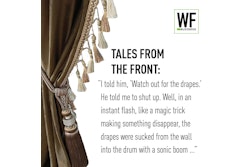I had been in business for five years, and although business wasn't stagnating, I knew I could do better. Like most contractors, I'm more of a hands-on artist, not a business person. So, I decided to take on a business partner. He was the brother-in-law of my girlfriend at the time. He had moved here from Europe and he spoke four languages; he was intelligent and charming. He was also an attorney. We discussed the partnership at length and went over the numbers, and he realized that it could be quite a profitable business for him. He had good business sense and financial acumen. So, we became full partners— 50/50. It was a simple deal. We incorporated the business by paying something like $400 and submitting our paperwork to the state.
Financially, things improved for me right away. He handled the money much better, and we made more of it. He tracked job costs, which I had never done formally. At the time we had six guys, including me, and the job costing made a big difference in profit. Then he created an estimating form, and the estimating really improved. We got all our bills paid on time and kept all our creditors happy. I trusted him fully—he took care of the checkbook, and I never handled the money after that.
RELATED: Mark Scheller Invents New Method to Create Curving Wood Floor
Then, slowly, we weren't making so much money. There was always money to pay the bills, but after about a year I noticed we weren't accumulating money like we had been. Previously when we needed to buy a machine the capital was there, but now it wasn't. Our accounts always balanced, but my mom and I started casually looking through the receipts and noticed that we were buying a lot of milk for coffee—gallons a week. You don't need more than a gallon a week for six guys for coffee. I began to realize he was nickel-and-diming me. Then we bought a used truck for $1,800. There were two payments for the truck, but we switched banks between the two payments and somehow ended up making three payments—the third one went to him. My mother ended up going through all the files, and the receipts were quite thorough. The truck payment was the biggest thing. Most of the receipts that weren't legit were for 20 bucks here, 30 bucks there … but they ended up coming to nearly $25,000.
I confronted him, and he had already realized we knew there was a problem. In fact, one summer day when I came back to the office, he was burning a fire. It turned out he was burning records. He resigned and relinquished his partnership in the business. When he left, his last deed was to steal 35 rolls of toilet paper out of a 36-roll box. I should have let the entire episode end with that last roll of toilet paper, but I didn't.
I hired an attorney and spent about $5,000 on letter writing and those kinds of formalities. I was doing a job for the attorney at that time, and he stiffed me on $8,900, so I stopped using him. Then I got another lawyer who was much more skilled at this sort of thing. His advice was to drop the case and move on with my life, but I didn't want this guy to get off scot-free. The attorney said that part of the fault was mine—that I "knew or should have known" about the problems, which didn't make me feel any better.
RELATED: How to Protect Your Wood Flooring Business By Implementing Internal Financial Controls
I did pursue it. I felt I had been wronged; I was bitter. Altogether, I ended up spending $25,000 in legal fees. We sued him and he countersued us (his wife was included as part of the lawsuit, which made me popular with my girlfriend). It came to a head when depositions were impending. In the midst of this, he wanted to buy a house, and that made it urgent for him to settle the whole thing. I'm not allowed to talk about the amount we did receive, but it didn't begin to replace what I lost or offset my legal expenses.
When you incorporate, you can write your own rules about your partnership. We should have written that if you end up having to sue your partner and you win, that he pays your legal fees. In the end, I was emotionally successful, but that's all. I didn't get to keep the check. My attorney kept it and showed me a copy.
Even worse, we realized that when my partner had been finishing jobs, to save money, he hadn't been adding the cross-linker, so we had to go back and resand and refinish many floors. In the end, between the money he stole, the legal fees, the jobs I had to redo, and the business I lost while redoing jobs, I figure the whole episode cost me more than $100,000.
One thing I should have done is tried to check into his past a little more. I found out after the fact that he had left his previous job on bad terms. Once we were partners, a simple thing I should have done is have a second party audit the books; they would have caught the problems right away. In fact, I think that would have prevented them. Once the problems happened, I should have followed my attorney's advice about not suing.
Now I have an accountant—I take everything there, but he doesn't handle any of the money. I'll never make that mistake again.
RELATED: A Crisis of Betrayal Transforms This Company Forever































